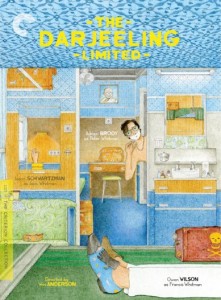 As the brothers Whitman run toward the train, the slow motion photography kicks in, as do the Kinks, and the crescendo of obvious dialogue, “This baggage isn’t going to make it,” is uttered, you may find yourself exhausted. Indeed, when I first saw the film at a press screening half a decade ago, one of the more obnoxious reviewers in the crowd decided it was quite appropriate to sigh throughout the entire film. Wes Anderson has this effect on people, and his last live action film, The Darjeeling Limited is no different. And there are many reasons for this—the style, the repeated themes, the disconnect from the upper middle class world of his characters, even the perfectly crafted soundtracks. All these aspects of his films are both cool and distancing, deep and superficial, dramatic and flat. This is especially true with The Darjeeling Limited because, as Matt Zoller-Seitz remarks in his visual essay on the bluray, it is a distillation of many of Anderson’s themes, both a representation and watermark. This makes the film either entrancing for someone who has never seen an Anderson film or possibly disappointing as his fifth effort. Repeated viewing helps, and now we have that chance, courtesy of a new bluray from the Criterion Collection.
As the brothers Whitman run toward the train, the slow motion photography kicks in, as do the Kinks, and the crescendo of obvious dialogue, “This baggage isn’t going to make it,” is uttered, you may find yourself exhausted. Indeed, when I first saw the film at a press screening half a decade ago, one of the more obnoxious reviewers in the crowd decided it was quite appropriate to sigh throughout the entire film. Wes Anderson has this effect on people, and his last live action film, The Darjeeling Limited is no different. And there are many reasons for this—the style, the repeated themes, the disconnect from the upper middle class world of his characters, even the perfectly crafted soundtracks. All these aspects of his films are both cool and distancing, deep and superficial, dramatic and flat. This is especially true with The Darjeeling Limited because, as Matt Zoller-Seitz remarks in his visual essay on the bluray, it is a distillation of many of Anderson’s themes, both a representation and watermark. This makes the film either entrancing for someone who has never seen an Anderson film or possibly disappointing as his fifth effort. Repeated viewing helps, and now we have that chance, courtesy of a new bluray from the Criterion Collection.
The film itself follows a spiritual rouse, perpetuated by the eldest brother of his younger siblings. Presented as a spiritual journey, complete with deadlines, plans and itineraries designed to hit the hot spots of Indian temples and the like, it is really a journey for the brothers to reconnect with their mother. The falsities of the planned spiritual journey are not unlike the superficial presentations of emotions that Anderson’s characters emote. It is rare to see a character in one of his films that processes their pain in a totally healthy way. But they do work at it, and these processes of loss and redemption are the stuff of Darjeeling Limited.
Included on the bluray are some great additions to the previous dvd release. A commentary with the writers and director, an essay following the thematic development of the film, behind the scenes footage from Roman Coppola’s video diary of the writing of the screenplay, and others. There are even some extended and deleted scenes (my favorite of which is of the brothers playing cricket with a local group of children).
This film gets better with each viewing. When I first saw it, I nearly took offence at the inclusion of the venomous snake, a nod to Renoir’s, The River, which becomes only a punch line in Anderson’s film. Now, I understand it as yet another attempt by the Whitman brothers to tempt death, as they do not understand themselves the power of the emotions with which they deal. Their journey is just the beginning.
Wes Anderson plays with fire. I came to this same conclusion years ago and remain on the fence today. The film does an excellent job at building its momentum, finally finding release in the wetted eyes of a woman who has also removed herself from the pain, withdrawn from the scorching flames of the fire. The characters, and Anderson, ply with this fire, showing us the after effects, whether they are the bandaged faces, the collected trinkets from the past, or the short stories written as a rehearsal of the pain. Yet these characters are never engulfed. There is another train awaiting them, where their old patterns can resume; plans, sweet lime, father’s glasses. I guess I have some more healing to do, indeed. But perhaps that is too harsh, and there is plenty to be seen and enjoyed in the film. Perhaps the revelation that the scars won’t heal is revelation enough.
-Rob Ribera